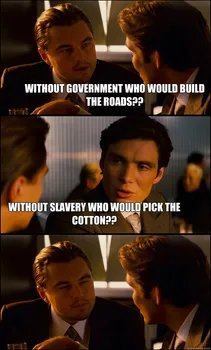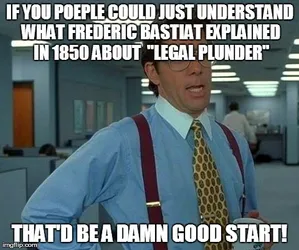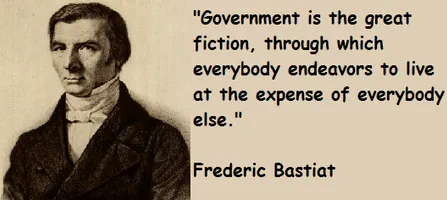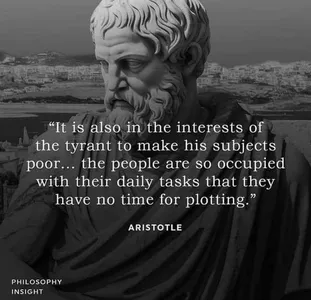| Dear Hiveans | Liebe Hiver | Queridos Hiveanos |
|---|---|---|
| Today I'd like to share my favourite excerpts from the book "The Law" (goodreads) by Frédéric Bastiat, who was a French economist, thinker and writer, and according to Joseph Schumpeter "the most brilliant economic journalist who ever lived". (wiki) | Heute meine Lieblingsauszüge aus dem Buch „Das Gesetz“ (goodreads) von Frédéric Bastiat. Bastiat war ein französischer Wirtschaftswissenschaftler, Denker und Schriftsteller und laut Joseph Schumpeter „der brillanteste Wirtschaftsjournalist, der je gelebt hat“. (wiki) | Hoy mis extractos favoritos del libro «La Ley» (goodreads) de Frédéric Bastiat, que fue un economista, pensador y escritor francés, y según Joseph Schumpeter «el periodista económico más brillante que jamás haya existido». (wiki) |
Preface
Bastiat believed that all human beings possessed the God-given, natural rights of "individuality, liberty, property." "This is man," he wrote. These "three gifts from God precede all human legislation." But even in his time—writing in the late 1840s—Bastiat was alarmed over how the law had been "perverted" into an instrument of what he called legal plunder. Far from protecting individual rights, the law was increasingly used to deprive one group of citizens of those rights for the benefit of another group, and especially for the benefit of the state itself. He condemned the legal plunder of protectionist tariffs, government subsidies of all kinds, progressive taxation, public schools, government "jobs" programs, minimum wage laws, welfare, usury laws, and more.
Bastiat's warnings of the dire effects of legal plunder are as relevant today as they were the day he first issued them. The system of legal plunder (which many now celebrate as "democracy") will erase from everyone's conscience, he wrote, the distinction between justice and injustice. The plundered classes will eventually figure out how to enter the political game and plunder their fellow man. Legislation will never be guided by any principles of justice, but only by brute political force. The great French champion of liberty also forecast the corruption of education by the state. Those who held "government-endowed teaching positions," he wrote, would rarely criticize legal plunder lest their government endowments be ended.
The system of legal plunder would also greatly exaggerate the importance of politics in society. That would be a most unhealthy development as it would encourage even more citizens to seek to improve their own well-being not by producing goods and services for the marketplace but by plundering their fellow citizens through politics.
Bastiat was also wise enough to anticipate what modern economists call "rent seeking" and "rent avoidance" behavior. These two clumsy phrases refer, respectively, to the phenomena of lobbying for political favors (legal plunder), and of engaging in political activity directed at protecting oneself from being the victim of plunder seekers. (For example, the steel manufacturing industry lobbies for high tariffs on steel, whereas steel-using industries, like the automobile industry, can be expected to lobby against high tariffs on steel). The reason why modern economists are concerned about "rent seeking" is the opportunity cost involved: the more time, effort and money that is spent by businesses on conniving to manipulate politics — merely transferring wealth—the less time is spent on producing goods and services, which increases wealth. Thus, legal plunder impoverishes the entire society despite the fact that a small (but politically influential) part of the society benefits from it.
… "Dictatorship" need not involve an actual dictator. All that was needed, said Bastiat, was "the laws," enacted by a Congress or a Parliament, that would achieve the same effect: forced conformity.
- Striking and very topical.
Nothing, therefore, can be more evident than this: The law is the organization of the natural right of lawful defense; it is the substitution of collective for individual forces, for the purpose of acting in the sphere in which they have a right to act, of doing what they have a right to do, to secure persons, liberties, and properties, and to maintain each in its right, so as to cause justice to reign over all.
And if a people established upon this basis were to exist, it seems to me that order would prevail among them in their acts as well as in their ideas. It seems to me that such a people would have the most simple, the most economical, the least oppressive, the least to be felt, the most restrained, the most just, and, consequently, the most stable Government that could be imagined, whatever its political form might be.
Now, labor being in itself a pain, and man being naturally inclined to avoid pain, it follows, and history proves it, that wherever plunder is less burdensome than labor, it prevails; and neither religion nor morality can, in this case, prevent it from prevailing.
When does plunder cease, then? When it becomes more burdensome and more dangerous than labor. It is very evident that the proper aim of law is to oppose the fatal tendency to plunder with the powerful obstacle of collective force; that all its measures should be in favor of property, and against plunder.
... It is in the nature of men to rise against the injustice of which they are the victims. When, therefore, plunder is organized by law, for the profit of those who perpetrate it, all the plundered classes tend, either by peaceful or revolutionary means, to enter in some way into the manufacturing of laws. These classes, according to the degree of enlightenment at which they have arrived, may propose to themselves two very different ends, when they thus attempt the attainment of their political rights; either they may wish to put an end to lawful plunder, or they may desire to take part in it. Woe to the nation where this latter thought prevails amongst the masses, at the moment when they, in their turn, seize upon the legislative power!

In the first place, it would efface from everybody's conscience the distinction between justice and injustice. No society can exist unless the laws are respected to a certain degree, but the safest way to make them respected is to make them respectable. When law and morality are in contradiction to each other, the citizen finds himself in the cruel alternative of either losing his moral sense, or of losing his respect for the law — two evils of equal magnitude, between which it would be difficult to choose.
Is there any need to prove that this odious perversion of law is a perpetual source of hatred and discord, that it even tends to social disorganization? Look at the United States. There is no country in the world where the law is kept more within its proper domain—which is, to secure to everyone his liberty and his property. Therefore, there is no country in the world where social order appears to rest upon a more solid basis. Nevertheless, even in the United States, there are two questions, and only two, that from the beginning have endangered political order. And what are these two questions? That of slavery and that of tariffs; that is, precisely the only two questions in which, contrary to the general spirit of this republic, law has taken the character of a plunderer. Slavery is a violation, sanctioned by law, of the rights of the person. Protection is a violation perpetrated by the law upon the rights of property; and certainly it is very remarkable that, in the midst of so many other debates, this double legal scourge, the sorrowful inheritance of the Old World, should be the only one which can, and perhaps will, cause the rupture of the Union. Indeed, a more astounding fact, in the heart of society, cannot be conceived than this: That law should have become an instrument of injustice. And if this fact occasions consequences so formidable to the United States, where there is but one exception, what must it be with us in Europe, where it is a principle — a system?
| Written in 1850 this was very prescient. And though Americans are very critical when it comes to their government, I still think in the US "law is kept more within its proper domain" compared to Europe or many other countries. | Dieses Buch wurde 1850 geschrieben und war sehr vorausschauend. Und obwohl die Amerikaner sehr kritisch sind, wenn es um ihre Regierung geht, denke ich immer noch, dass in den USA „das Recht mehr in seinem eigenen Bereich gehalten wird“ als in Europa oder vielen anderen Ländern. | Escrito en 1850, fue muy clarividente. Y aunque los estadounidenses son muy críticos cuando se trata de su gobierno, sigo pensando que en EE.UU. «la ley se mantiene más dentro de su propio dominio» en comparación con Europa o muchos otros países. |
[...] plunder may be only an exceptional blemish in the legislation of a people, and in this case, the best thing that can be done is, without so many speeches and lamentations, to do away with it as soon as possible, notwithstanding the clamors of interested parties. But how is it to be distinguished? Very easily. See whether the law takes from some persons that which belongs to them, to give to others what does not belong to them. See whether the law performs, for the profit of one citizen, and, to the injury of others, an act that this citizen cannot perform without committing a crime. Abolish this law without delay; it is not merely an iniquity—it is a fertile source of iniquities, for it invites reprisals; and if you do not take care, the exceptional case will extend, multiply, and become systematic. No doubt the party benefited will exclaim loudly; he will assert his acquired rights. He will say that the State is bound to protect and encourage his industry; he will plead that it is a good thing for the State to be enriched, that it may spend the more, and thus shower down salaries upon the poor workmen. Take care not to listen to this sophistry, for it is just by the systematizing of these arguments that legal plunder becomes systematized.
And this is what has taken place. The delusion of the day is to enrich all classes at the expense of each other; it is to generalize plunder under pretense of organizing it. Now, legal plunder may be exercised in an infinite multitude of ways. Hence come an infinite multitude of plans for organization; tariffs, protection, perquisites, gratuities, encouragements, progressive taxation, free public education, right to work, right to profit, right to wages, right to assistance, right to instruments of labor, gratuity of credit, etc., etc. And it is all these plans, taken as a whole, with what they have in common, legal plunder, that takes the name of socialism.
It is not considered enough that law should be just, it must be philanthropic. It is not sufficient that it should guarantee to every citizen the free and inoffensive exercise of his faculties, applied to his physical, intellectual, and moral development; it is required to extend well-being, instruction, and morality, directly over the nation. This is the fascinating side of socialism. But, I repeat it, these two missions of the law contradict each other. We have to choose between them. A citizen cannot at the same time be free and not free. Mr. de Lamartine wrote to me one day thus: "Your doctrine is only the half of my program; you have stopped at liberty, I go on to fraternity." I answered him:
"The second part of your program will destroy the first." And in fact it is impossible for me to separate the word fraternity from the word voluntary. I cannot possibly conceive fraternity legally enforced, without liberty being legally destroyed, and justice legally trampled under foot. Legal plunder has two roots: one of them, as we have already seen, is in human greed; the other is in misconceived philanthropy.
👍
And because we do not ask so much at the hands of the law, because we only ask it for justice, it alleges that we reject fraternity, solidarity, organization, and association; and they brand us with the name of individualists. We can assure them that what we repudiate is not natural organization, but forced organization. It is not free association, but the forms of association that they would impose upon us.
It is not spontaneous fraternity, but legal fraternity. It is not providential solidarity, but artificial solidarity, which is only an unjust displacement of responsibility.
Socialism, like the old policy from which it emanates, confounds Government and society. And so, every time we object to a thing being done by Government, it concludes that we object to its being done at all. We disapprove of education by the State—then we are against education altogether. We object to a State religion—then we would have no religion at all. We object to an equality which is brought about by the State then we are against equality, etc., etc. They might as well accuse us of wishing men not to eat, because we object to the cultivation of corn by the State.
| Oh, how often did I have this exact discussion... | Oh, wie oft habe ich genau diese Diskussion geführt... | Oh, cuántas veces tuve esta misma discusión... |


And, in fact, what is the political work that we are endeavoring to promote? It is no other than the instinctive effort of every people towards liberty. And what is liberty, whose name can make every heart beat, and which can agitate the world, but the union of all liberties, the liberty of conscience, of education, of association, of the press, of movement, of labor, and of exchange; in other words, the free exercise, for all, of all the inoffensive faculties; and again, in other words, the destruction of all despotisms, even of legal despotism, and the reduction of law to its only rational sphere, which is to regulate the individual right of legitimate defense, or to repress injustice?
This tendency of the human race, it must be admitted, is greatly thwarted, particularly in our country, by the fatal disposition, resulting from classical teaching and common to all politicians, of placing themselves beyond mankind, to arrange, organize, and regulate it, according to their fancy. For whilst society is struggling to realize liberty, the great men who place themselves at its head, imbued with the principles of the 17th and 18th centuries, think only of subjecting it to the philanthropic despotism of their social inventions, and making it bear with docility, according to the expression of Rousseau, the yoke of public felicity as pictured in their own imaginations. This was particularly the case in 1789. No sooner was the old system destroyed than society was to be submitted to other artificial arrangements, always with the same starting point—the omnipotence of the law.
- Rousseau? 🤢
The pretensions of organizers suggest another question, which I have often asked them, and to which I am not aware that I ever received an answer: Since the natural tendencies of mankind are so bad that it is not safe to allow them liberty, how comes it to pass that the tendencies of organizers are always good?
Do not the legislators and their agents form a part of the human race? Do they consider that they are composed of different materials from the rest of mankind? They say that society, when left to itself, rushes to inevitable destruction, because its instincts are perverse. They presume to stop it in its downward course, and to give it a better direction. They have, therefore, received from heaven, intelligence and virtues that place them beyond and above mankind: let them show their title to this superiority. They would be our shepherds, and we are to be their flock. This arrangement presupposes in them a natural superiority, the right to which we are fully justified in calling upon them to prove. You must observe that I am not contending against their right to invent social combinations, to propagate them, to recommend them, and to try them upon themselves, at their own expense and risk; but I do dispute their right to impose them upon us through the medium of the law, that is, by force and by public taxes.
… To presume to have recourse to power and taxation, besides being oppressive and unjust, implies further, the pernicious assumption that the organized is infallible, and mankind incompetent. And if mankind is not competent to judge for itself, why do they talk so much about universal suffrage?

What is law? What ought it to be? What is its domain? What are its limits? Where, in fact, does the prerogative of the legislator stop? I have no hesitation in answering, Law is common force organized to prevent injustice;—in short, Law is Justice.
It is not true that the legislator has absolute power over our persons and property, since they pre-exist, and his work is only to secure them from injury. It is not true that the mission of the law is to regulate our consciences, our ideas, our will, our education, our sentiments, our works, our exchanges, our gifts, our enjoyments. Its mission is to prevent the rights of one from interfering with those of another, in any one of these things.
Law, because it has force for its necessary sanction, can only have the domain of force, which is justice. And as every individual has a right to have recourse to force only in cases of lawful defense, so collective force, so which is only the union of individual forces, cannot be rationally used for any other end. The law, then, is solely the organization of individual rights that existed before law.
Law is justice.
So far from being able to oppress the people, or to plunder their property, even for a philanthropic end, its mission is to protect the people, and to secure to them the possession of their property. It must not be said, either, that it may be philanthropic, so long as it abstains from all oppression; for this is a contradiction. The law cannot avoid acting upon our persons and property; if it does not secure them, then it violates them if it touches them.
The law is justice.
God has implanted in mankind also all that is necessary to enable it to accomplish its destinies. There is a providential social physiology, as well as a providential human physiology. The social organs are constituted so as to enable them to develop harmoniously in the grand air of liberty. Away, then, with quacks and organizers! Away with their rings, and their chains, and their hooks, and their pincers! Away with their artificial methods! Away with their social laboratories, their governmental whims, their centralization, their tariffs, their universities, their State religions, their inflationary or monopolizing banks, their limitations, their restrictions, their moralizations, and their equalization by taxation! And now, after having vainly inflicted upon the social body so many systems, let them end where they ought to have begun—reject all systems, and try liberty — liberty, which is an act of faith in God and in His work.
| I enjoyed this short book very much. It is very topical and many of today's pro-liberty memes seem to be rooted in Bastiat's ideas. | Dieses kurze Buch hat mir sehr gut gefallen. Es ist sehr aktuell und viele der heutigen pro-Freiheit-Memes scheinen in Bastiats Ideen verwurzelt zu sein. | He disfrutado mucho con este breve libro. Es muy actual y muchos de los memes pro-libertad de hoy en día parecen tener sus raíces en las ideas de Bastiat. |
Have a great day,
zuerich


 h
h




